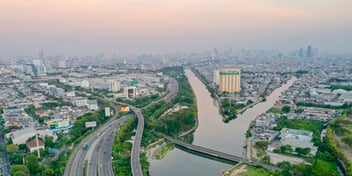Size no barrier to sustainability for North East Water
Making a commitment to the Sustainable Development Goals (SDGs) gives water utilities a chance to be local leaders in helping to address global issues, no matter the business' size.
North East Water, which provides water and sewerage services to about 108,000 people in north-east Victoria, recently adopted the SDGs as a way of contributing more broadly than just to the communities it serves.
Of the 17 SDGs, North East Water Executive Customer and Culture Rebecca Jhonston said the utility is primarily focusing on six: Goal 5: Gender Equality; Goal 6: Clean Water and Sanitation; Goal 9: Industry, Innovation and Infrastructure; Goal 11: Sustainable Cities and Communities; Goal 12: Responsible Consumption and Production; and Goal 13: Climate Action.
“We were quite unfamiliar with the goals, so we launched a six-month project to look at how they applied to us,” Jhonston said.
“We looked at why we exist, our supply chain and our strategy.”
From this, it was apparent North East Water was already progressing some of the aims. Providing clean water and sanitation is an obvious one, but it was also contributing to climate action by developing Victoria’s first water treatment plant powered by solar and battery storage.
“However, there were some areas where we felt we could do more,” Jhonston said.
“That’s how our commitment to Goal 12 came about; we knew we could be doing more from a procurement perspective and within our supply chain.”
As a result, North East Water will undertake a review of its procurement processes to remove social biases, and will investigate its supply chain to ensure responsible production.
Jhonston said the utility is also committed to doing more to advance gender equality, particularly when it comes to operational roles. As a first step, it has partnered with a local school to run an apprenticeship program for female school leavers.
“We’re in a very male-dominated industry, so we’re trying to balance that and gain greater gender equality in our workforce,” she said.
“We’re looking at different ways of making the water industry more attractive to women.”
Goals give a greater purpose
Jhonston said North East Water’s commitment to the SDGs isn’t about creating more work for employees, but giving them another way to view the important work they’re already doing.
The utility will conduct internal progress reviews twice a year, using case studies to show how its projects are contributing to the six priority goals.
“We want our staff to feel they’re part of something that is having a global impact,” she said.
“We hope the goals help staff progress initiatives within the business and give them a reason to pursue certain projects.”
In future, North East Water will promote the SDGs as part of its recruitment process in order to attract staff who share the organisation’s values. It will also incorporate the goals into its customer messaging.
“We see the SDGs as a way of attracting talent to our business,” Jhonston said.
“We also want to show our communities that we don’t just supply water and wastewater services to them; we’re contributing to important global issues that matter to our people and to our communities.”
Jhonston said it was initially daunting to take on the SDGs, but encouraged other water corporations to do the same.
"As a small business, we didn’t think we had the resources,” she said.
“But once you look into the goals, you realise you can make them work for your business. They’re not as overwhelming as you think.
“That was a lightbulb moment for us: just by looking at why you exist, you can already see that the things you’re doing can contribute to making a positive difference.”

